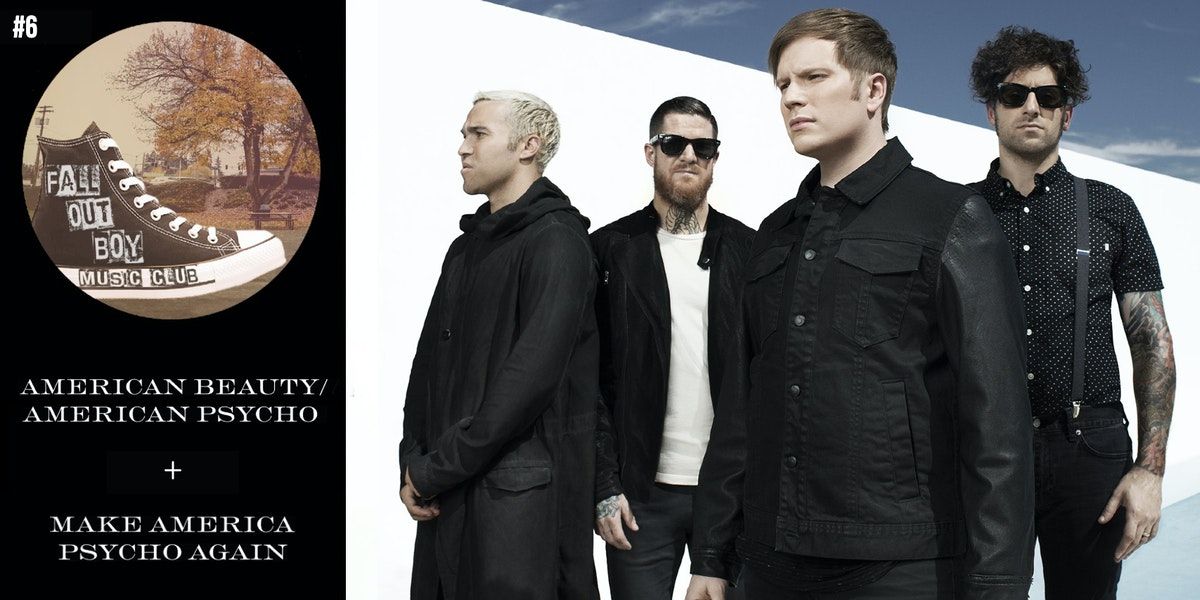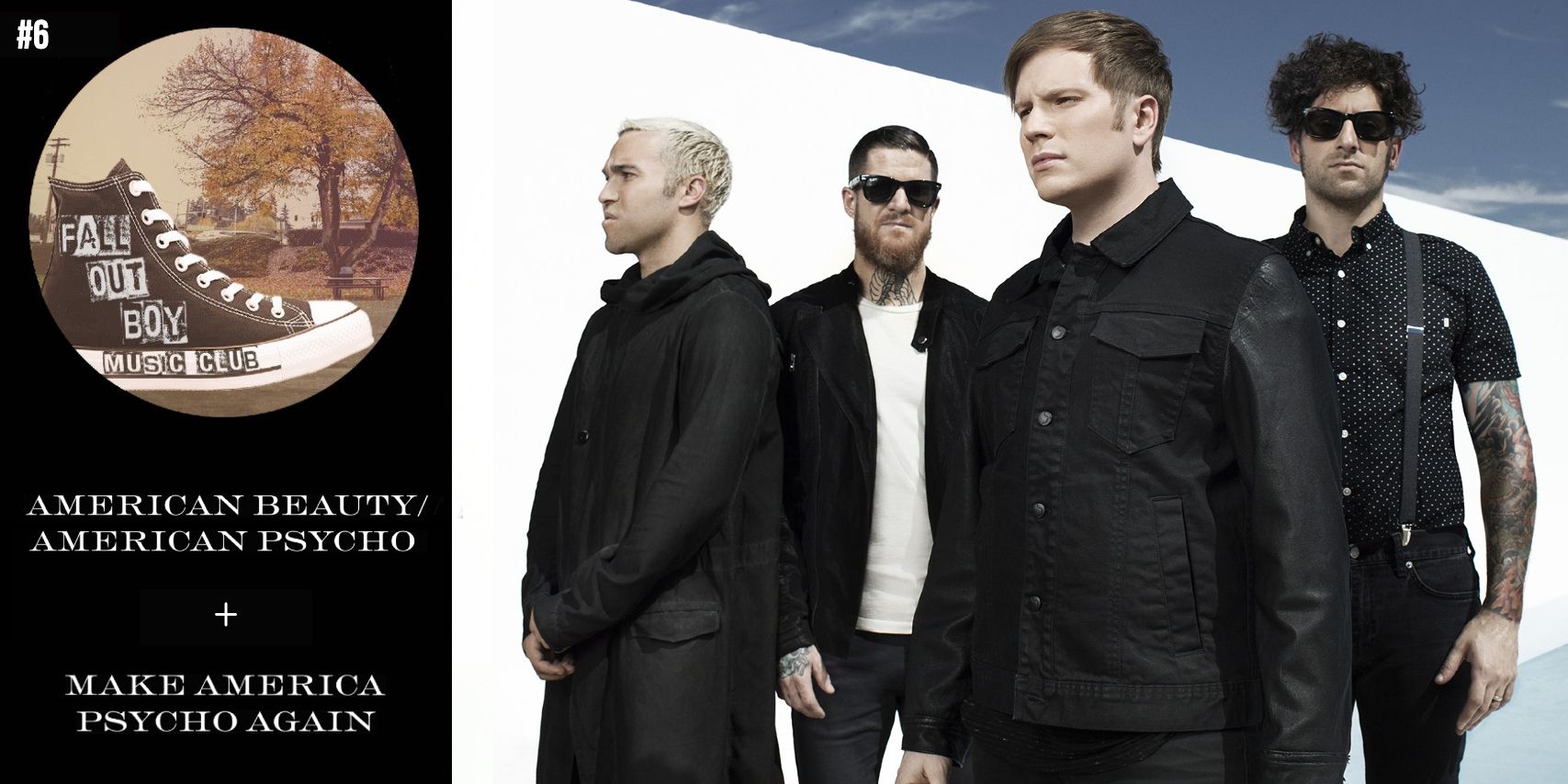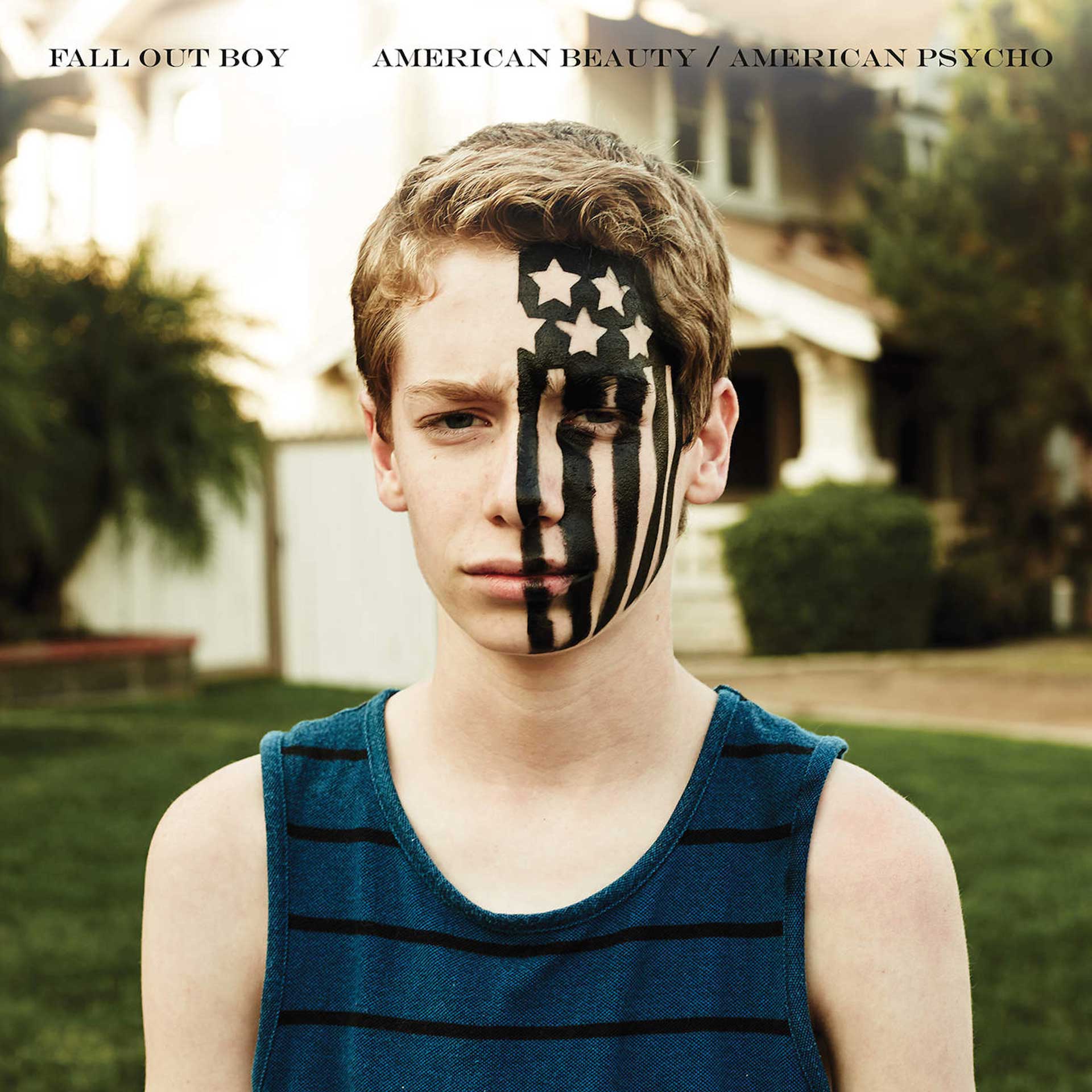FOBMC #6: "American Beauty/American Psycho"
What the hell is happening!?

Welcome back to the Fall Out Boy Music Club! It’s the official fall of Fall Out Boy here at Friendmendations — every other week, we’ll analyze the discography of Chicago’s angstiest export. Share the link on social media! Get all your former emo friends to join the club!
We’ve covered almost all of Fall Out Boy’s discography: Take This to Your Grave, From Under the Cork Tree, Infinity on High, Folie à Deux, and Save Rock and Roll (plus the debut of their protégés, Panic! at the Disco.) Today’s the penultimate club meeting. I listened to American Beauty/American Psycho for the first time! Oh no!

Fall Out Boy lost me in 2013 with Save Rock and Roll. I was 22, the same age Pete Wentz was when he founded the band back in 2001, and it wasn’t that I felt like I’d outgrown them — I still listened to their old stuff just like blink-182 when I wanted to feel like a bratty teen. Rather, the band’s new output gave me the impression that the band itself was moving backwards, making their music sound dumber and less interesting. If they’d one made music for bratty teens, this felt aimed at middle schoolers.
In fact, “Immortals,” one of the songs from their 2015 album American Beauty/American Psycho, originally appeared in a Disney movie. I didn’t know that until researching this, because I never listened to this album at all. I’m catching up in real time. So imagine my surprise when I, a scholar of Fall Out Boy, had to hear the title track for the first time:
WHAT IS THIS?!? What the fuck is this?! How did they go from “Sugar We’re Goin Down” to this in just ten years? The dual references are lame as hell. It would be a dumb album title even if the song didn’t exist. The production is cacophonous. Apparently a Mötley Crüe song is sampled, not that I would recognize it, but I’m mostly reminded of the throwback camp of “Nude Beach A-Go-Go,” an intentionally obnoxious pastiche by Azealia Banks and Ariel Pink. They might not sound similar, but both make me wonder if I’m being trolled.
My question is not “Why?,” because the band is pretty clear on their intentions post-hiatus. They wanted to change their sound to something more radio-friendly. This approach seems to have been a direct response to Folie à Deux’s negative reception from fans and critics, which the band members (and Patrick in particular) mention in almost every interview after reconvening. The new goal was accessibility, a tricky thing to achieve without other bands to model themselves after. As Pete said in one interview:
We realize that while we are not in the upper echelon of [acts] like Foo Fighters, Paul McCartney, Coldplay—these bands that are clearly legacy [acts], they are huge, and everyone knows them and what they sound like—I think we’re also not a starter band. We’re somewhere along, like, the JV. Our goal—or the mission statement—is to make rock music that can be played in big venues, but is also contemporary and you can hear it on the radio. It is a bit of a challenge to do it, because I feel like… we feel like a little bit more on an island. I feel like when we started this out, there was a movement of bands, and now it feels like we’re alone.
My question, then, is “Why this?” Why go so far in the pop direction that the music no longer sounded like Fall Out Boy at all? For all of their experimentation, the first four Fall Out Boy albums have the signature sound created by all four members: Patrick’s vocals, Pete’s lyrics, Joe’s guitar, and Andy’s drums. Although all four members still wrote the albums post-hiatus, the sound was completely different. It’s impossible to hear what Joe and Andy contributed, Pete’s lyrics are simpler and Patrick’s vocals more intense, and the result is that it sounds like a different band. Why not just become a different band, then? Jefferson Airplane had some changes in lineup before becoming Jefferson Starship, but the idea was the same: new sound, new project. The members of Fall Out Boy should have reunited as a pop group called Radioactive Man!
Let’s analyze this album, then, as the second album from Radioactive Man. This is not the same group who wrote Take This To Your Grave. This is a band returning two years after Save Rock and Roll for their sophomore effort, American Beauty/American Psycho.

Patrick said in one interview that they wanted this album to sound more cohesive than Save Rock and Roll, which had featured songs in a variety of styles (knockoff Adele, knockoff Train, knockoff Skrillex, etc.) AB/AP does sound cohesive, in that most of the songs sound alike. They’re all anthems. They’re all big. Patrick’s vocals are dialed up to 11 on every single song here. One cut literally begins with the line “This is a black ski mask song.” Intimidating!
As with Save Rock and Roll, everything is a bit bland lyrically. Pete Wentz writing for Radioactive Man is pretty different than Pete writing for Fall Out Boy. Sure, there are metaphors that don’t make sense and references that will make you cringe — see one song’s opening line “I’ve got those jet pack blues, just like Judy,” a Jetsons reference that I cannot begin to parse — but the songs are composed like pop songs, so there’s not much density to the verses. Where Pete once wrote twisted wordplay that inspired a young Taylor Swift, now it seemed like Pete was trying to write a Taylor Swift song. “Fourth of July” sounds just like her, down to the holiday celebration in its title; “You and I were fireworks that went off too soon” sounds like a metaphor from one of Swift’s simpler love songs, not like the man who wrote “I’ll be your best-kept secret and your biggest mistake.” “Jet Pack Blues” features a hook similar to Swift writing on auto-pilot for a movie soundtrack: “I remember ‘baby, come home’” uses the same emotional shorthand as her chorus in “I Don’t Wanna Live Forever.”
If you don’t subscribe to my thesis that we should treat pre- and post-hiatus FOB as two different bands, listen to these songs back to back:
It’s the same metaphor, now completely toothless. “Dead on Arrival” tells an underdog story, the narrator desperately trying to earn someone’s love like a challenging but brilliant song: “This is side 1, flip me over / I know I’m not your favorite record / but those songs you’ve grown to like never stick at first / so I’m writing you a chorus and here is your verse.” Post-Folie, though, they’re not interested in challenging songs. The metaphor on “Favorite Record” is simple: you love your favorite records and you love me. “And we danced, we danced,” Patrick sings like Macklemore clowning the concept of epic dance songs. Patrick’s voice even gets run through a Vocoder, unironically, in a song with lyrics about riding shotgun with the windows down and dancing under the stars. They don’t want you to have to grow to like them anymore.
Fall Out Boy was always unashamed of being emotional. Radioactive Man, though, seem unashamed of making bad music. It’s a much worse kind of vulnerability. Look at their reliance on samples on AB/AP. Lead single “Centuries” samples Suzanne Vega’s classic “Tom’s Diner” for absolutely no reason. “Tom’s Diner” is about mundanity, a simply observed slice of life that originally had no instrumentation at all. The hook that formed the beat of its more popular remix was an ad-lib at the end of Vega’s a cappella recording. It evoked humming to yourself as you go about a normal day. Here, Radioactive Man uses the sample for an epic song about going down in history.
Is that subversive? Is it supposed to be irony? Not that I can tell — Pete said they wanted to “re-inject that into pop culture” because, as Patrick explained, “I feel like it was so ubiquitous when we were kids… that song was absolutely everywhere and it just kind of disappeared. I haven’t heard it in a minute. And I was like that’s a shame. That was such an amazing song. I would love for that to get some kind of tip of the hat.” If they noticed that the song had lost relevance, it feels like the opposite of the theme of timeless impact described in “Centuries!” And that’s not even the most nonsensical sample on the album. “Uma Thurman” is an absolute mess, a song about Tarantino movies that samples the Munsters theme song because its use of surf guitar sounds SLIGHTLY SIMILAR to the Pulp Fiction theme!
That’s the problem with Radioactive Man: they throw references in for the sake of recognition without any further meaning. The audience is just supposed to go “Oh, this reminds me of that thing I like.” Fall Out Boy had always shoved pop culture references into song titles, but they often actually made sense: “A Little Less Sixteen Candles, A Little More ‘Touch Me’” describes a song about a teenage romance that’s less than wholesome by referencing two touchstones of teen media. “Hum Hallelujah” interpolated Leonard Cohen’s song because Pete had been listening to it when he attempted suicide and the song was a reflection on that experience. Post-hiatus, though, you get references like their video for the remix to “Irresistible.”
It’s an homage to NSYNC’s “It’s Gonna Be Me,” directed by that video’s director and featuring Chris Kirkpatrick and Joey Fatone, but it doesn’t comment on why. “It’s Gonna Be Me” was a spoof on the idea that boy bands were manufactured and talentless, and it promoted an album titled No Strings Attached to reference NSYNC’s legal battles with manager Lou Pearlman. What’s the commentary here? That Fall Out Boy saw that NSYNC video? It doesn’t tie into the song, an ode to toxic love inspired by Sid and Nancy, because it’s not about relationships at all. It could have shown a child play-acting a dramatic relationship with the Fall Out Boy dolls or had the dolls malfunctioning as a joke about being “damaged.” It could have been set in a Hot Topic, not a generic toy store! Any perspective at all would be interesting!
I’m not sure if the video is more or less pointless than the terribly titled Make America Psycho Again, a full album of rap remixes of AB/AP. I would comment on it, but it’s a full album of rap remixes of AB/AP. There’s really not much to be said. It exists. For some reason.
If you can’t tell, I’m not a fan of Radioactive Man. I was a fan of Fall Out Boy. I’m still a fan of Fall Out Boy. I just consider them a band that only put out four albums. Some fans were also offended by the new sound, something that Save Rock and Roll producer Butch Walker addressed in a Twitter rant before the release of AB/AP. He insisted that producers aren’t responsible for changing a band’s sound: “God Forbid, the ARTIST comes in with their vision.” And that’s fair — the song he produced for Infinity, “Don’t You Know Who I Think I Am?,” fits the sound of that album and sounds unlike anything he produced on Save Rock and Roll. But I do blame Jake Sinclair and J.R. Rotem, the team who produced most of AB/AP, for some of the terrible ideas here. Patrick said that the “Tom’s Diner” sample was Rotem’s idea! Which makes sense! Rotem and Sinclair also produced a TRULY god-awful song that samples “Rock Lobster” for another “band” that’s now a pop project with no connection to its original sound. Producers deserve some blame, Butch!
Radioactive Man is a fine pop group, if that’s what you’re into. “American Beauty/American Psycho” is a terrible song, but “Irresistible” is pretty catchy, with its goofy slips into French and Spanish that make it seem intentionally dramatic. You could make a decent playlist of Radioactive Man songs from the highlights of Save Rock and Roll and American Beauty/American Psycho. But I won’t, personally. I won’t spin either one of them again. They’re simply not my favorite records, and I can’t grow to like them even though they didn’t stick at first. It’s just not the band I loved.
Next time in the Fall Out Boy Music Club: we reach the end.
The Fall Out Boy Music Club logo was designed by Chuck Kaslow. Please tell your friends to join the club!
